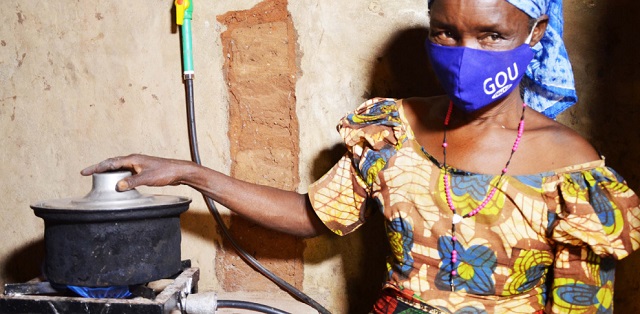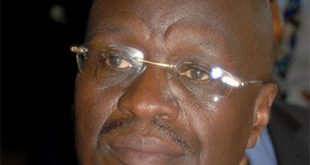
High investment cost is to blame for low uptake of biogas digesters among the population
Kampala, Uganda | ISAAC KHISA | Margaret Atimango, one of the 30 members of Kudinger People Living with HIV/AIDS, no longer wakes up worried on how to prepare meals for her family.
Before the Food and Agriculture Organization of the United Nations and partners installed a manure-fed Flexi Biogas digester nearly three months ago, the mother of seven and four grandchildren, spends a lot of time daily collecting firewood in the neighbouring bare rugged hills to meet the home’s cooking needs.
“I also used to get so worried when I would send my children to look for firewood. There are many risks involved, they can be attacked by snakes, it may rain on them and so many bad things can happen to them,” said the 51 -year old Atimango, a subsistence farmer and a small scale businessman in Parambo Sub-county in Nebbi District.
“In addition to smoke affecting my eyes, I didn’t have time to interact with my fellow women and share the growth opportunities and challenges in our community,” she said.
She said the biogas stove lights faster and are quicker in cooking various foods and thus guaranteeing her a lot of time to involve in other trade.
“There is also no shortage of cow dung as neighours are always willing to give it to me, in return for digested slurry – a byproduct of the biogas – for their crops as fertiliser,” Atimango said.
Flexi Biogas – the process of producing energy by converting biological waste using a flexible above-ground system– is gaining popularity in developing countries including Uganda as a way of minimising reliance on cutting down trees for firewood and fossil fuels.
FAO in partnership with the European Union and the Swedish Embassy is installing 200 Flexi-Biogas systems in the West Nile districts of Arua, Zombo, Yumbe, Koboko, Nebbi, Maracha, as well as in the Central Cattle Corridor Districts of Nakasongola, Luwero, Nakaseke, Mubende, Kiboga, Sembabule, Lyantonde, Kalungu and Gomba.
This is part of the five-year Climate-Resilient Livelihood Opportunities for Women Economic Empowerment (CRWEE) project that started in 2018 worth US$8.9million.
So far, 32 flexi-biogas systems have been installed in Nebbi, Arua, Luwero and Kalungu districts.
In addition, 48 youth have been selected and trained as Service Provider Entrepreneurs (SPEs) in installation, maintenance and scaling up flexi-biogas technology.
However, this is not the first time that the development partners are advising the local community to embrace biogas energy but the uptake has been low.
The experts have blamed the low uptake to the former dome shaped system that required among others high technical expertise and complex logistics required, making installation expensive and time-consuming.
Emmanuel Zziwa, the Climate Change expert at FAO, said a home unity of a flexi biogas costs Shs6million depending on the size.
Cutting down the cost
However, Zziwa says one can reduce costs of establishing the system by reducing its size depending on the size of household.
The government has also removed taxes on renewable energy equipment including biogas to encourage the population embrace clean energy.
Zziwa says rallying the population to embrace biogas will help in forest restoration as it will minimize demand for people to cut trees on a daily basis in search for firewood.
Currently, available statistics indicates Uganda loses about 122, 000 hectares annually and forest cover reduced from 24% to 9% from 1990 to 2015.
This comes as Uganda gears up to join the rest of the world to commemorate International Day of Forests on March 21.
Caroline Awachango, a small scale farmer at Messi Lower Village in Ndhew Sub Country in Nebbi District said flexi biogas has proved a good source of cooking.
“In fact, my husband used not to enter the kitchen. Now he does it, preparing meals for us,” she said.
“Now the kitchen has become even more important than my main house. It doesn’t have smoke and I now frequently prepare meals for my family. In fact, I am now inspired to make a modern kitchen,” added Collins Awekonimungu, Awachango’s husband.
He suggests that the new technology be extended to a large population as the step would reduce reliance on trees for firewood, conserve the environment and reduce their impact on climate change.
****
 The Independent Uganda: You get the Truth we Pay the Price
The Independent Uganda: You get the Truth we Pay the Price



